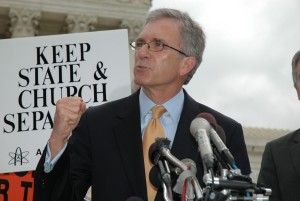
BJC Executive Director Brent Walker speaks to media on the steps of the Supreme Court following oral arguments in two Ten Commandments cases in 2005.
BJC: government-sponsored Ten Commandments monuments violate government neutrality, lead to ‘desacralized’ religious texts
In the 2000s, the BJC was involved in three cases challenging displays of the Ten Commandments on government property.
At the urging of Alabama clergy from various denominations, the BJC filed a brief opposing Alabama Chief Justice Roy Moore’s infamous Ten Commandments monument in the Alabama State Judicial Building. For the clergy and many other defenders of religious liberty, the display was an affront to the constitutional values that protect all religions. Allowing it would place the government in the position of selecting and advancing favored religious messages, violating the government neutrality toward religion required by the First Amendment. The monument was eventually removed, and Moore lost his judicial post for failing to comply with a federal court order.
When the Supreme Court finally addressed the constitutionality of Ten Commandments displays on government property in a case out of Texas and another out of Kentucky, the BJC joined church-state scholar and law professor Douglas Laycock to file briefs proposing an approach that would simplify the disposition of many religious display cases in the lower courts. The BJC argued that when government displays a sacred text, courts should presume that it endorses that text. Absent evidence at the display negating the presumption, such displays are unconstitutional.
The BJC also explained how a public display can lead to watered-down religion and “desacralized” texts. “Time after time, in litigation that is nearly always highly publicized, government minimizes the religious significance of government-sponsored religious practices or displays,” according to the brief filed by the BJC in Van Orden v. Perry. “Government insists that sacred texts are really primarily secular in their meaning, or that they have been displayed primarily for secular purposes and have primarily secular effects. In this process, government lends its weight to distorted readings of sacred texts; indeed, government litigators deliberately desacralize these sacred texts. Secular readings of the text are promoted; the religious understanding of the faith groups to whom the text is sacred are deemphasized or ignored.”
The Court issued split decisions in the two Ten Commandments cases (Van Orden v. Perry, 2005; McCreary Co., Ky. v. ACLU of Ky., 2005), upholding the display in Texas and striking down the one in Kentucky. During the oral arguments in the Kentucky case, Justice Ruth Bader Ginsburg mentioned the BJC’s brief from the bench in a question posed to one of the attorneys.
Though the decisions emphasized distinct facts that influenced the outcome of each case, such as the history and physical surroundings of the displays, courts have continued to struggle with religious display cases. The decisions did not create a new legal standard, but they instead continued a case-by-case approach to determining whether a government display should stand. The opinions reflect the practical difficulty of protecting against government promotion of religion without relegating all religion to the private realm.
“Government-sponsored religious monuments are always constitutionally suspect and theologically questionable. Any rule that puts government in the position of making religious decisions threatens the freedom of religion,” BJC General Counsel Holly Hollman wrote in 2005. “Those who share the BJC perspective on religious liberty will continue to promote the Ten Commandments (and other scriptural mandates) in a way that the Bible encourages: by writing them on our hearts, as the prophet Jeremiah instructed.”
McCreary Co., Ky. v. ACLU of Ky.
BJC brief Supreme Court decision Oral argument transcript
Van Orden v. Perry
BJC brief Supreme Court decision Oral argument transcript
Related articles:
Making sense of the Ten Commandments cases
Decision analysis By K. Hollyn Hollman, BJC General Counsel
Supreme Court’s review of Ten Commandments cases an opportunity for education on religious liberty
Case preview by K. Hollyn Hollman, BJC General Counsel
Religion harmed, not helped, by Ten Commandments display (Alabama case)
By K. Hollyn Hollman, BJC General Counsel




